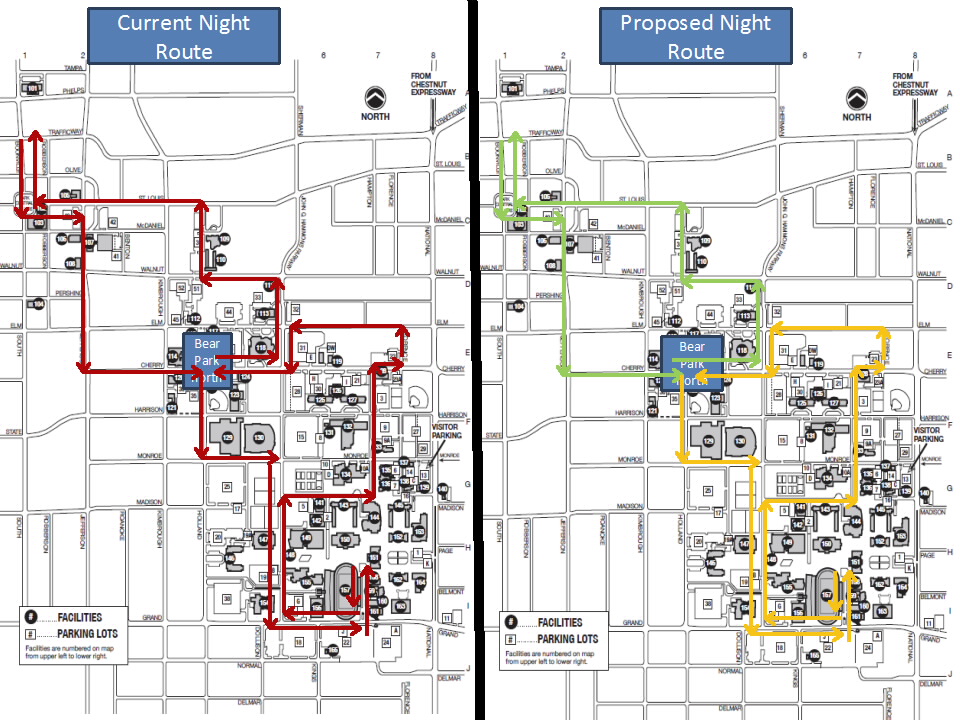1. Is there any way I could get a copy of the documents you used at the SGA meetings that showed the changes for the Wyrick Guidelines and the SGA Constitutional changes?
All documents should be available for review on the SGA website at http://sga.missouristate.edu/elections/
2. Why is it important for students to vote on these changes?
As answered by Justin Mellish, Student Body Vice President:
It is important for students to become educated on the changes being proposed and decide whether or not they are changes that should be made; these changes will affect how the Student Government Association functions, which ultimately affects decisions made by the organization. Ultimately, the Student Senate felt that these changes are for the best and will allow SGA to function more effectively and efficiently.
Wyrick Guidelines
The Standard and Brett Foster, Chief Wyrick Commissioner
3. I know many of the changes are stylistic, but what are the important changes that students should know about?
There is one amendment that stands out as more substantial than the stylistic changes: The addition of a “preliminary” Wyrick proposal deadline. This new deadline will be 2-3 weeks before the official deadline that is currently in place (and will remain in place). The purpose of this new deadline is to get students in touch with the Wyrick Commission before the official deadline, enabling them to work with appropriate administrators as they complete their proposal. It also serves students by allowing the commission to assess the eligibility of a proposal before the student has invested the time needed to complete an entire Wyrick Proposal. There is a clause that allows for students who miss the preliminary deadline to still be eligible to submit a proposal by scheduling a meeting with the Wyrick Commissioner.
4. Why did you think these changes, like the addition of the Internet and getting rid of practices that were never followed, were important to make to the guidelines?
These changes served to bring a much-needed update to the Wyrick Guidelines. By amending the guidelines to include placing Commission meeting times and minutes on the Internet, we are making the commission more transparent to the students. The guidelines also contained numerous errors, such as references to constitution sections that didn’t exist. We felt the need to remove section XI (which was never followed) because it is inaccurate to tell students that they will be recognized with a plaque when this is a practice that has never been implemented. Due to the nature of most Wyrick proposals the placement of recognition plaques is rarely feasible, and that is why we removed the section all together.
5. Will any of these changes significantly affect the student body? How?
As outlined in answer (1), students who are wishing to submit a proposal will be significantly affected by the new deadline, which will enable them to get in contact with appropriate administrators and the Wyrick Commission before completing the official proposal.
SGA Constitution
The Standard and Emily Bernet, Speaker Pro Tempore
6. Other than the stylistic changes, what are the major changes that are occurring in the constitution that students should know about?
There are a few major changes that are occurring in the SGA Constitution. The first is that the Senior Class President is being moved to the executive branch exclusively. Next, the Director of Communication was added to the Constitution. There was also a change made to allow for a process to dictate what happens in the instance that the Vice President fails to deliver legislation to the President to be signed. A resignation process was added for members of SGA, and the Good Faith Resolution and Fiscal Responsibility Resolution were added to the Constitution. Other major changes were made to clarify processes that occur within SGA.
7. Why was it decided to change the Senior Class President to one branch, either legislative or executive, instead of keeping that person in both?
The Senior Class President was moved to the executive branch for several reasons. First, the nature of the position is that it is an executive position. Second, since the senior class is given 5 senior class representatives, having the Senior Class President act as a senator meant that the senior class was over-represented. Third, the Senior Class President affects the quorum of Senate but there are no repercussions for missing meetings like there are for other Senators (outside of impeachment by the senior class). The Internal Affairs Committee and I decided that it was more appropriate to place the Senior Class President in the executive branch and Senate agreed with that decision.
8. Why should the vote be changed from 2/3rds to 3/4ths? Will that change things for Senate or make it harder for resolutions and decisions to pass?
The vote for ratification of the SGA Constitution was changed from 2/3 to ¾. A 2/3 vote is required for ratification to the Constitution as a whole. A ¾ vote is required for ratification to an amendment to the Constitution. IAC did not see any reason that there should be a different vote for the two very similar processes. This potentially could make changes to the SGA Constitution harder; however, theoretically changes to a governing document should be more difficult.
9. Will any of these changes significantly affect the student body? How?
The changes that are being proposed by Senate to the student body to vote on will not significantly affect the student body. The changes were mostly for internal functioning.

